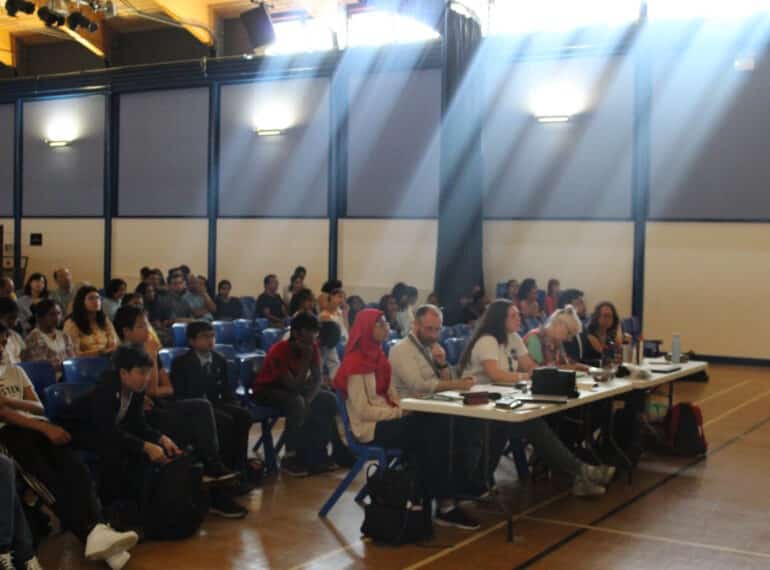
Teams from QE and The Henrietta Barnett School aimed to turn science fiction into future reality when they planned for a settlement of the red planet in a space design competition.
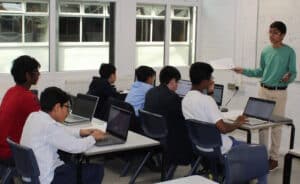 Four teams – two from each school – battled it out in the Galactic Challenge, which was hosted by QE. Helping out on the Saturday of the competition were a trio of Old Elizabethans who are themselves veterans of space competitions.
Four teams – two from each school – battled it out in the Galactic Challenge, which was hosted by QE. Helping out on the Saturday of the competition were a trio of Old Elizabethans who are themselves veterans of space competitions.
Their one-day mission: to boldly produce proposals for an Earth–Mars cycler settlement – a future orbiting hotel which would ferry 1,000 people to and from Mars in six to 14 months following a ‘cycler’ trajectory that regularly intersects the orbits of the two planets.
QE Head of Physics Jonathan Brooke said: “The boys presented with great skill and confidence. The proposal from both QE teams were thorough, dealing carefully with key challenges from the RFP [Request for Proposal – which reflected a typical design brief in the space engineering industry].”
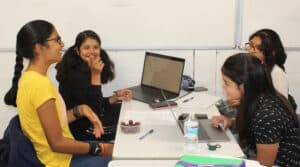 Galactic Challenge, which is for students aged 10-14, is the sister competition of the UK Space Design Competition (UKSDC), which is for those aged 15–18.
Galactic Challenge, which is for students aged 10-14, is the sister competition of the UK Space Design Competition (UKSDC), which is for those aged 15–18.
The 12-strong teams each formed fictional aerospace companies: Astrodyne Delta; Columbus Aviation; Infinity Airspace, and Solaris Flight Systems. They elected company officers within the team, such as the company president, and vice-presidents. The CEO roles in each company were undertaken by Year 12 volunteers, who were there to guide and mentor the Key Stage 3 teams, rather than to lead. The QE CEOs were Soumil Sahjpall and Haradhat Ramanathan.
Teams were transported 60 years into the future, to the year 2083, where space travel might be commonplace.
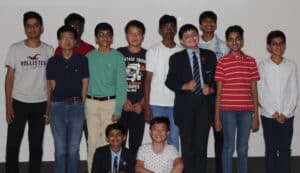 The RFP asked companies to deal with various challenges. These included:
The RFP asked companies to deal with various challenges. These included:
- Critical systems – for example: how the settlement would be powered; how liveable conditions would be maintained; how passengers would be fed
- Emergency response, including an evacuation procedure for the settlement
- Workforce issues, including use of automation
- Marketing and ensuring that the venture could be an economic success.
Now in Year 13, Soumil said: “Volunteering as a CEO was both fun and rewarding. The students were very keen, creative and enthusiastic.” His group, had researched well and learnt quickly “to compile a great proposal and presentation for the judges, including a CAD (computer aided design) and a promotional film”.
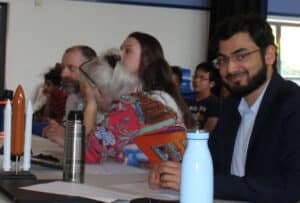 The judges’ panel featured staff from the Space Science & Engineering Foundation, QE Head of Physics Jonathan Brooke, Dr Flore Faille, Head of Physics at HBS, and Aadil Kara (OE 2010–2017).
The judges’ panel featured staff from the Space Science & Engineering Foundation, QE Head of Physics Jonathan Brooke, Dr Flore Faille, Head of Physics at HBS, and Aadil Kara (OE 2010–2017).
Aadil’s QE contemporaries, Sam Bayney and Harikesan Baskaran, were among those helping out on the day.
Aadil, Sam and Harikesan were all part of a QE Sixth Form team that won the regional heat of the UK’s Space Design Competition and went on to the 2017 national finals, where Aadil was selected to take part in the International Space Settlement Design Competition in Florida.
Aadil has for several years supported both Galactic Challenge and the UKSDC, and is a member of the UKSDC board. A Senior Analyst with the Cabinet Office, he graduated with a first in Physics from Imperial College London.
After the event, Mr Brooke reflected on the successful partnership event between QE and HBS and on the performance of QE’s teams: “I was particularly impressed by the meticulous attention to detail that Solaris applied to the financial side of their proposal.”
Once all the competition was done, however, final victory went to Columbus Aviation, one of the HBS teams.

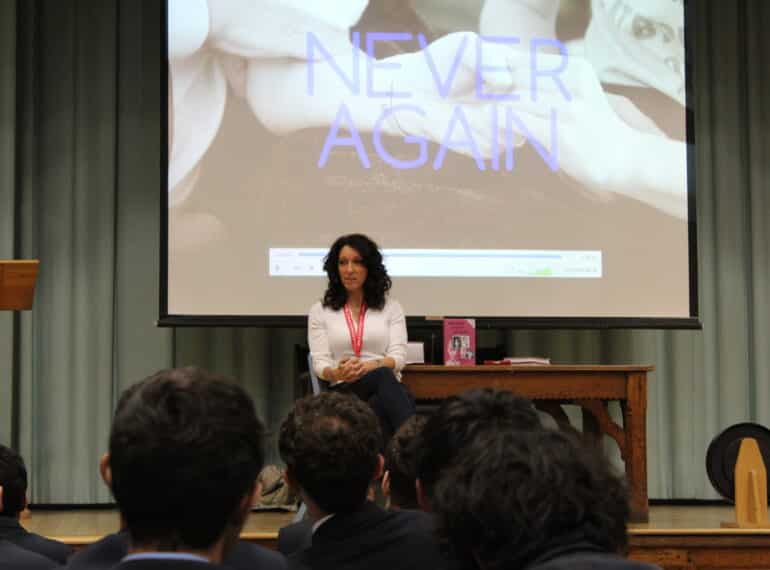
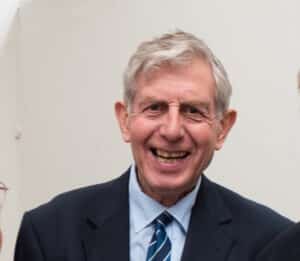 The visit had been suggested to the Headmaster, Neil Enright, by Old Elizabethan Alan Solomon (OE 1951–1957), pictured here.
The visit had been suggested to the Headmaster, Neil Enright, by Old Elizabethan Alan Solomon (OE 1951–1957), pictured here.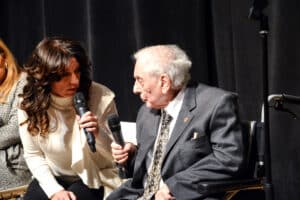 In the film, Mr Wermuth, pictured here with Ilana, explains how in 1942 he broke out of Klaj ammunition camp in Poland when he learned that Hitler was scheduled to pass through the village.
In the film, Mr Wermuth, pictured here with Ilana, explains how in 1942 he broke out of Klaj ammunition camp in Poland when he learned that Hitler was scheduled to pass through the village.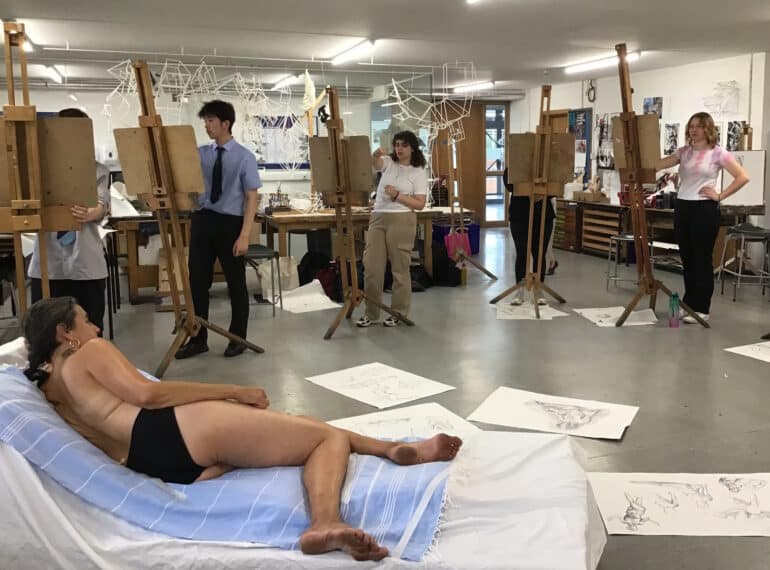
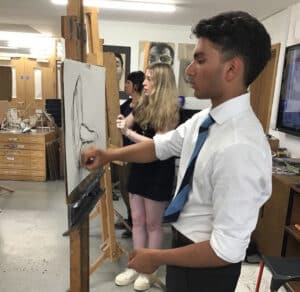 Together with the girls’ participation in filming a promotional video and in a Sketch-off event held as part of QE’s Design Festival earlier in the Summer Term, the life-drawing sessions mark an expansion of the work of the QE Together partnership, which had previously focused on community activities.
Together with the girls’ participation in filming a promotional video and in a Sketch-off event held as part of QE’s Design Festival earlier in the Summer Term, the life-drawing sessions mark an expansion of the work of the QE Together partnership, which had previously focused on community activities.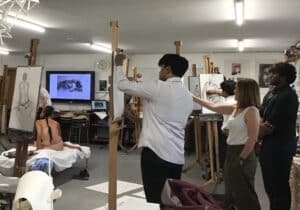 Led by pupils from the two schools, QE Together continued its community activities, with musicians coming together for another concert for care home residents.
Led by pupils from the two schools, QE Together continued its community activities, with musicians coming together for another concert for care home residents. QE Together is one of the newest of QE’s partnerships. The School also has firmly established academic partnerships with North London Collegiate School and The Henrietta Barnett School.
QE Together is one of the newest of QE’s partnerships. The School also has firmly established academic partnerships with North London Collegiate School and The Henrietta Barnett School.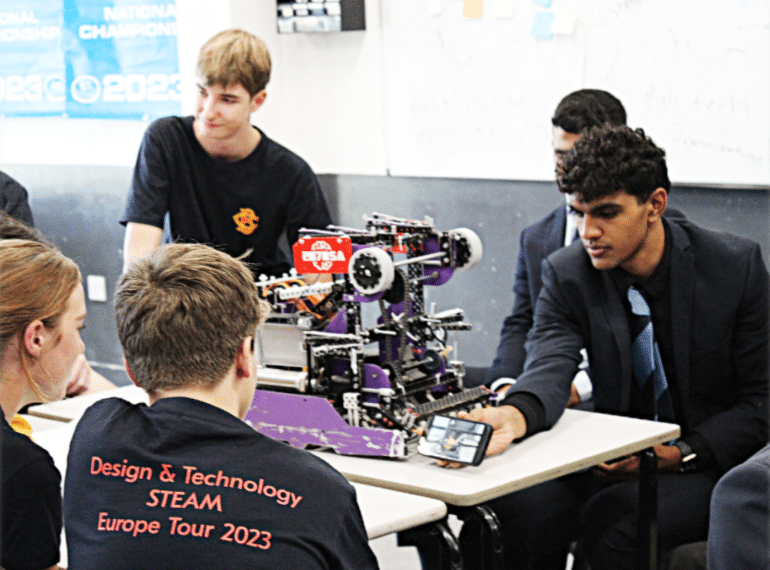
 The six IQ (Year 8 and 9) and three VRC (Year 10) teams picked up a string of trophies in Dallas, while also taking time to sample the sights of the city.
The six IQ (Year 8 and 9) and three VRC (Year 10) teams picked up a string of trophies in Dallas, while also taking time to sample the sights of the city.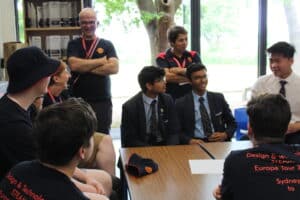 The 60-strong group of 15–17 year-old Australians called in during their trip to London and Paris. Their school, Barker College, is a large, high-achieving independent school on the North Shore of Sydney.
The 60-strong group of 15–17 year-old Australians called in during their trip to London and Paris. Their school, Barker College, is a large, high-achieving independent school on the North Shore of Sydney. At the senior level, the 19 VRC competitors collectively came away with six awards, including an Inspire Award and the Promote Video Online Challenge Award. Two of the three teams – Nova and Shattersquad – battled through tough early competition and successfully made it through to their divisional knockout stages.
At the senior level, the 19 VRC competitors collectively came away with six awards, including an Inspire Award and the Promote Video Online Challenge Award. Two of the three teams – Nova and Shattersquad – battled through tough early competition and successfully made it through to their divisional knockout stages.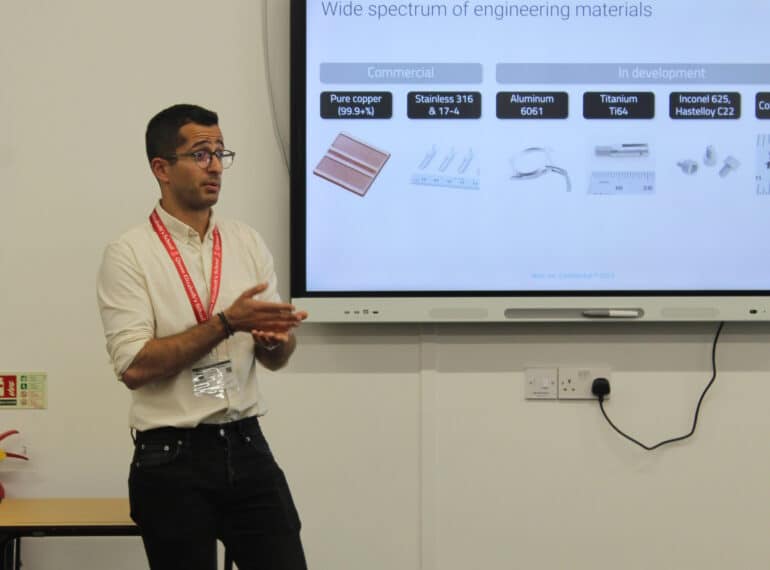
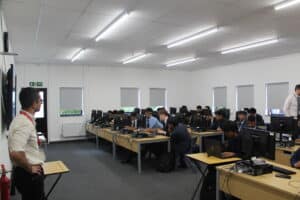 After working for global software firm Autodesk, based in San Francisco, Arian (OE 1998–2003) raised venture capital and successfully spun out its additive manufacturing team to form Holo, while also transitioning its technology from the 3D printing of polymers to metals. Six-and-a-half years later, Holo is at the forefront of innovation, using its proprietary digital platform to enable the manufacturing at scale of high-performance parts across a range of materials, including metals, ceramics and composites. Holo is supported by top-tier Silicon Valley investors and strategic partners.
After working for global software firm Autodesk, based in San Francisco, Arian (OE 1998–2003) raised venture capital and successfully spun out its additive manufacturing team to form Holo, while also transitioning its technology from the 3D printing of polymers to metals. Six-and-a-half years later, Holo is at the forefront of innovation, using its proprietary digital platform to enable the manufacturing at scale of high-performance parts across a range of materials, including metals, ceramics and composites. Holo is supported by top-tier Silicon Valley investors and strategic partners.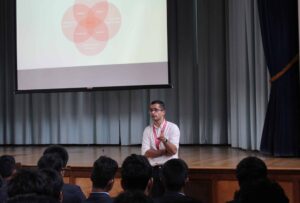 Head of Technology Michael Noonan said: “Arian provided Year 12 with a workshop which firstly covered his professional journey to date, from his early days post PhD working on founding his own company (The Invention Works) through to his position as Senior Principal Engineer at Autodesk. Most of the workshop, however, focussed on his current company, Holo. He explained that he and the other co-founders could see the enormous potential to create a viable business in this area and so pursued it as an opportunity.”
Head of Technology Michael Noonan said: “Arian provided Year 12 with a workshop which firstly covered his professional journey to date, from his early days post PhD working on founding his own company (The Invention Works) through to his position as Senior Principal Engineer at Autodesk. Most of the workshop, however, focussed on his current company, Holo. He explained that he and the other co-founders could see the enormous potential to create a viable business in this area and so pursued it as an opportunity.” The instrument should have six degrees of freedom
The instrument should have six degrees of freedom In the lunchtime talk to Year 10, Arian took a more personal look at his story, beginning with his time at QE, when he was in Stapylton House and was a musician and prefect.
In the lunchtime talk to Year 10, Arian took a more personal look at his story, beginning with his time at QE, when he was in Stapylton House and was a musician and prefect.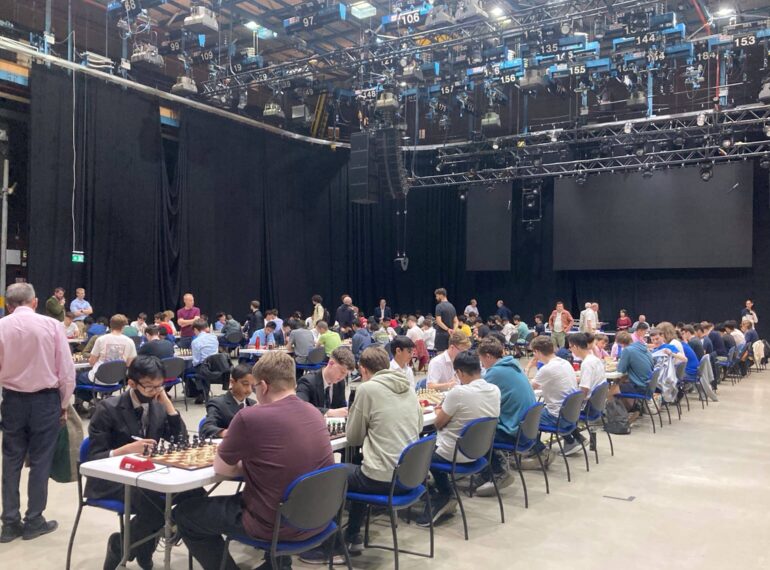
 Propelled by a string of strong mid-tournament performances over the two days of the English Chess Federation National Schools’ Championship, the six-strong team secured the Plate – QE’s first trophy at the finals – with a last-round victory over number one seeds, King’s College Wimbledon.
Propelled by a string of strong mid-tournament performances over the two days of the English Chess Federation National Schools’ Championship, the six-strong team secured the Plate – QE’s first trophy at the finals – with a last-round victory over number one seeds, King’s College Wimbledon.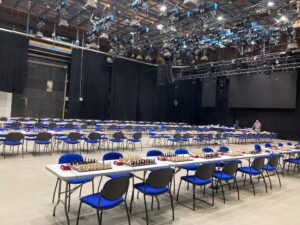 This set up a final-round showdown with King’s College Wimbledon. In what Mr Roberts described as his “particular highlight”, the QE six performed “superbly” to achieve a 3.5–2.5 victory and take both third place and the Plate – awarded to the highest-placed first-round losers.
This set up a final-round showdown with King’s College Wimbledon. In what Mr Roberts described as his “particular highlight”, the QE six performed “superbly” to achieve a 3.5–2.5 victory and take both third place and the Plate – awarded to the highest-placed first-round losers.